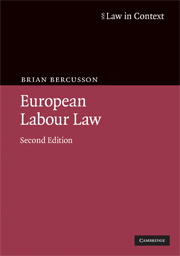Book contents
- Frontmatter
- Contents
- Preface
- Section I Labour law and Europe
- Section II The structure of European labour law
- Section III The futures of European labour law
- 20 The futures of European labour law: (1) the Commission's agenda – ‘modernisation’
- 21 The futures of European labour law: (2) the European Court's agenda and ordre communautaire social
- 22 The futures of European labour law: (3) the agenda of the Member States and of the European Parliament – the Lisbon Treaty and after
- Index
22 - The futures of European labour law: (3) the agenda of the Member States and of the European Parliament – the Lisbon Treaty and after
from Section III - The futures of European labour law
Published online by Cambridge University Press: 05 June 2012
- Frontmatter
- Contents
- Preface
- Section I Labour law and Europe
- Section II The structure of European labour law
- Section III The futures of European labour law
- 20 The futures of European labour law: (1) the Commission's agenda – ‘modernisation’
- 21 The futures of European labour law: (2) the European Court's agenda and ordre communautaire social
- 22 The futures of European labour law: (3) the agenda of the Member States and of the European Parliament – the Lisbon Treaty and after
- Index
Summary
A ‘constitutional’ future for European labour law
On 25 March 2007, the fiftieth anniversary of the Treaty of Rome, the twenty-seven Member States of the European Union meeting in Berlin acknowledged the need to ‘always renew the political shape of Europe in keeping with the times’. They declared their united objective of ‘placing the European Union on a renewed common basis before the European Parliament elections in 2009’. Following the debacle of the rejection by France and the Netherlands in 2005 of the proposed Treaty Establishing a Constitution for Europe, a final effort was being launched. At the press conference concluding the fiftieth anniversary celebrations, the German Chancellor, Angela Merkel, declared her intention that the June 2007 summit under the German Presidency should agree a road map. A new draft Treaty/Constitution was to be elaborated during the coming Portuguese Presidency of the Council so as to be ready by the end of 2007, to be ratified thereafter by the Member States during the period up to the European Parliament elections in June 2009.
The Berlin Declaration asserted that the European model ‘combines economic success and social responsibility’. The concerns over ‘Social Europe’ during the preparation of the Constitutional Treaty led to the inclusion of explicit social values, social and employment objectives, fundamental social rights, recognition of the role of the social partners, a strengthened ‘mainstreaming’ anti-discrimination clause and a ‘mainstreaming’ social clause.
- Type
- Chapter
- Information
- European Labour Law , pp. 715 - 737Publisher: Cambridge University PressPrint publication year: 2009



